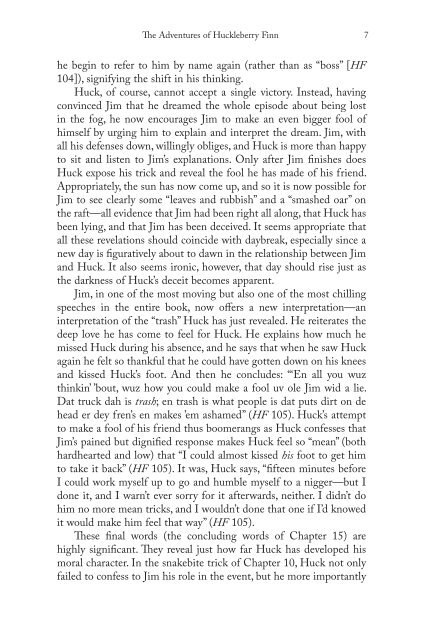Blooms Literary Themes - THE TRICKSTER.pdf - ymerleksi - home
Blooms Literary Themes - THE TRICKSTER.pdf - ymerleksi - home
Blooms Literary Themes - THE TRICKSTER.pdf - ymerleksi - home
Create successful ePaper yourself
Turn your PDF publications into a flip-book with our unique Google optimized e-Paper software.
Th e Adventures of Huckleberry Finn 7<br />
he begin to refer to him by name again (rather than as “boss” [HF<br />
104]), signifying the shift in his thinking.<br />
Huck, of course, cannot accept a single victory. Instead, having<br />
convinced Jim that he dreamed the whole episode about being lost<br />
in the fog, he now encourages Jim to make an even bigger fool of<br />
himself by urging him to explain and interpret the dream. Jim, with<br />
all his defenses down, willingly obliges, and Huck is more than happy<br />
to sit and listen to Jim’s explanations. Only after Jim fi nishes does<br />
Huck expose his trick and reveal the fool he has made of his friend.<br />
Appropriately, the sun has now come up, and so it is now possible for<br />
Jim to see clearly some “leaves and rubbish” and a “smashed oar” on<br />
the raft—all evidence that Jim had been right all along, that Huck has<br />
been lying, and that Jim has been deceived. It seems appropriate that<br />
all these revelations should coincide with daybreak, especially since a<br />
new day is fi guratively about to dawn in the relationship between Jim<br />
and Huck. It also seems ironic, however, that day should rise just as<br />
the darkness of Huck’s deceit becomes apparent.<br />
Jim, in one of the most moving but also one of the most chilling<br />
speeches in the entire book, now off ers a new interpretation—an<br />
interpretation of the “trash” Huck has just revealed. He reiterates the<br />
deep love he has come to feel for Huck. He explains how much he<br />
missed Huck during his absence, and he says that when he saw Huck<br />
again he felt so thankful that he could have gotten down on his knees<br />
and kissed Huck’s foot. And then he concludes: “‘En all you wuz<br />
thinkin’ ’bout, wuz how you could make a fool uv ole Jim wid a lie.<br />
Dat truck dah is trash; en trash is what people is dat puts dirt on de<br />
head er dey fren’s en makes ’em ashamed” (HF 105). Huck’s attempt<br />
to make a fool of his friend thus boomerangs as Huck confesses that<br />
Jim’s pained but dignifi ed response makes Huck feel so “mean” (both<br />
hardhearted and low) that “I could almost kissed his foot to get him<br />
to take it back” (HF 105). It was, Huck says, “fi fteen minutes before<br />
I could work myself up to go and humble myself to a nigger—but I<br />
done it, and I warn’t ever sorry for it afterwards, neither. I didn’t do<br />
him no more mean tricks, and I wouldn’t done that one if I’d knowed<br />
it would make him feel that way” (HF 105).<br />
Th ese fi nal words (the concluding words of Chapter 15) are<br />
highly signifi cant. Th ey reveal just how far Huck has developed his<br />
moral character. In the snakebite trick of Chapter 10, Huck not only<br />
failed to confess to Jim his role in the event, but he more importantly

















